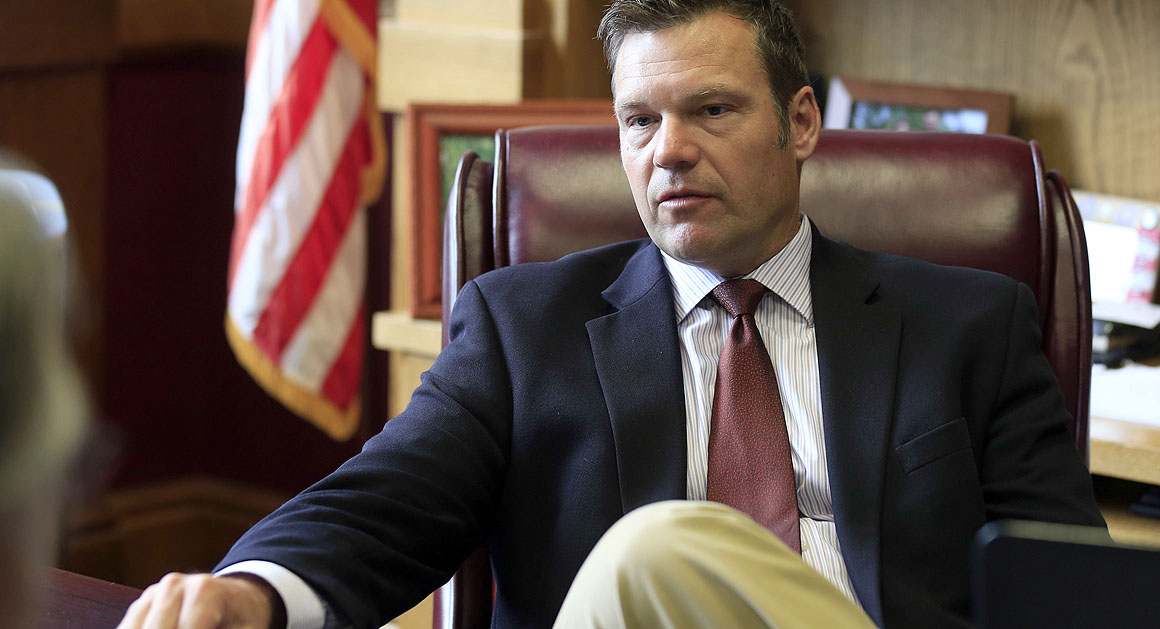A federal judge on Wednesday tore into President Trump’s voter commission for reneging on a promise to fully disclose public documents before a July 19 meeting, ordering the government to meet new transparency requirements and eliciting an apology from administration lawyers.
U.S. District Judge Colleen Kollar-Kotelly of Washington said the Election Integrity Commission released only an agenda and proposed bylaws before its first meeting at the White House complex last month.
But once gathered, commissioners had thick binders that included documents the public had not seen, including a specially prepared report and a 381-page “database” purporting to show 1,100 cases of voter fraud, both from the think tank Heritage Foundation. The group also received a typed list of possible topics to address from the panel vice chairman, Kansas Secretary of State Kris W. Kobach.
Kollar-Kotelly said the panel’s after-the-fact argument was “incredible” when it said it did not believe documents prepared by individual commissioners for the July meeting had to have been posted in advance.
“You didn’t completely live up to the government’s representations,” Kollar-Kotelly told Justice Department lawyers at Wednesday’s hearing. “I want to know what things are not going to be covered” by the government’s pledges, she said.
The exchange was the latest controversy surrounding the commission, which has roiled states with a sweeping request for the voting information of more than 150 million registered voters. Trump created the commission in May after repeatedly suggesting that millions of illegal voters cost him the popular vote against Democratic presidential nominee Hillary Clinton. Studies and state officials of both parties have found no evidence of widespread voting fraud.
Kollar-Kotelly directed the commission to detail what documents it believes are subject to disclosure ahead of its next meeting, set for Sept. 12 in New Hampshire, and how it is identifying and handling them.
Justice Department civil division attorney Elizabeth J. Shapiro apologized for what she called a good-faith error by staffers, saying the panel wrote members Tuesday informing them of disclosure obligations, “mak[ing] clear there should be no surprises.”
“It was truly an honest misunderstanding on the part of the commission with respect to its obligations to share information,” Shapiro said, based on what she described as mistaken guidance from the Office of Legal Counsel. “It was not an attempt to hide anything. It fully intends to be as transparent as possible. . . . I wanted to convey our apologies and our sincere regret for that.”
Administration officials have said 30 states have agreed to share at least some voter data, adding that the commission requested only publicly available data and would anonymize any information it released.
Many state leaders from both parties have objected to what they regard as the potential to reveal personal information, suppress voter participation and encroach on states’ oversight of voting laws.
Critics say Kobach has compared the commission’s work to efforts to pool state data and called for collecting “whatever data there is” on individuals’ potential voting eligibility within the federal government, including information kept by the departments of Justice and Homeland Security and the U.S. Census Bureau.
Shapiro said the commission has gotten off to a “chaotic start,” saying the panel had not known Trump planned to appear at its first meeting and learned of his intention only the night before or on the day of the session, “so arrangements had to be made.”
“There was a little bit of unknown and a little bit of disorganization in terms of how the meeting would happen,” Shapiro said, while also acknowledging staffers were aware ahead of time that one commissioner planned to make a presentation.
The federal court hearing came in a lawsuit filed by the Lawyers’ Committee for Civil Rights Under Law that is challenging the commission’s compliance with federal open government laws. It is one of seven pending suits, Shapiro said, including five that have sought to block some aspect of the commission’s activity.
Source: https://www.washingtonpost.com/local/public-safety/trump-voting-panel-apologizes-after-judge-calls-failure-to-disclose-information-incredible/2017/08/30/675001ba-8d93-11e7-8df5-c2e5cf46c1e2_story.html?utm_term=.7b45ee80a5e4
